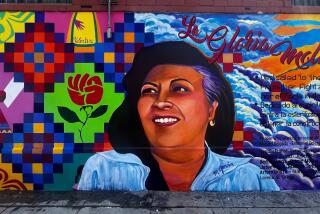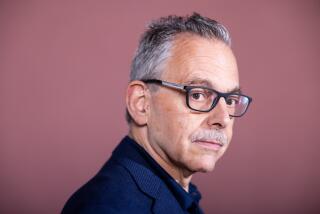USC’s Natalia Molina wins MacArthur fellowship for work on immigrant stereotypes
- Share via
When Natalia Molina was growing up in Echo Park in the 1970s, she’d spend evenings at the Mexican restaurant her mother owned, Nayarit, a neighborhood staple her grandmother founded in 1951 that was frequented by a cross-section of the city: immigrants, Dodgers players after games, celebrities such as Marlon Brando and Rita Moreno. The nights were late, and after hours of people watching and escorting customers to their tables, a young Natalia would crawl into a red vinyl booth and fall asleep, her belly full of enchiladas suizas or stewed ribs in a spicy red sauce.
Molina, a professor of American studies and ethnicity at USC, is now at work on the book “Place-makers: The Story of an Ethnic Mexican Community in Twentieth-Century Los Angeles,” which explores the restaurant’s history as an urban anchor for immigrants. Her third book, it fits right into her oeuvre: The historian has spent nearly two decades exploring how long-held stereotypes and narratives of immigrant communities have shaped our views about race and public policy.
On Tuesday morning, Molina was named a 2020 MacArthur fellow, recognized by the John D. and Catherine T. MacArthur Foundation for “revealing how narratives of racial difference that were constructed and applied to immigrant groups a century ago continue to shape national policy today.”
Molina thought she was joining a phone call with MacArthur staffers to discuss other nominees when she learned of her award last month.
“I had my yellow legal pad out, my pen was poised,” she said. “Then they said: ‘We’d like to talk about the nominee, and that nominee is you!’ I was shocked. It was such a brain jam. But then it was just gratitude. This will be good for talking about race, social justice, issues of equality. It was just: Thank you for caring about these issues.”
Of this year’s 21 fellows across the arts, education, science, media, law and environmental studies, Molina’s work on race, gender, culture and citizenship is particularly timely, essentially at the heart of the national conversation as America undergoes a reckoning over systemic racism and grapples with questions of equity, inclusion and identity.
“There is this moment — we’re seeing how people’s civil rights and human rights are being disregarded,” she said. “One moment it’s the story of George Floyd, the next an Asian American who’s had acid thrown on them, and the next, a child being separated from their parents — and that can be in one day. We need to see how these racial moments are connected so that we can make systemic change.”
Not surprisingly, Molina has been especially busy as a media commentator and public speaker during the pandemic, having done more than a dozen interviews for TV, radio and print outlets on “race, health, place and how we remember history,” she said, including the toppling of the Junipero Serra statue in downtown L.A. and forced sterilization at an Immigration and Customs Enforcement detention center in Georgia.
“It’s emotionally exhausting,” she said, referring to a media cycle in constant crisis mode. “When you do the research to prepare for interviews, even if you’ve studied this stuff, the stories of discrimination, abuse, it still affects you.”
Molina, who lives in Pasadena and is spending the 2020-2021 academic year as a Huntington Library fellow, is at work on another book, “The Silent Hands That Shaped the Huntington: A History of Its Mexican Gardeners.”
“This book and ‘Place-makers,’ what they have in common is: Let’s tell this story that hasn’t been told about people who helped make this city/space/labor possible,” she said. “These are the workers who we still kind of erase.”
What will she do with the $625,000, no-strings-attached MacArthur stipend meant to free up fellows to pursue new projects?
“I think I’d have a better answer if we weren’t in a pandemic. It’s hard to plan for anything right now,” she said. “But it allows you to think more ambitiously about your work, how you tell these stories. Maybe it’s going beyond just being in the archives; what kind of digital humanities could you do, what kind of platform could you use to spread this information and work with other people?”
Molina offers a thoughtful pause, the silence quickly filled by a knowing chuckle.
“I think about that Eleanor Roosevelt quote: What would you do if you could not fail?” Molina said. “Well the MacArthurs are like: ‘Go ahead, be ambitious. Even if you fail, you’ll be alright!’”
Full list of 2020 MacArthur fellows
Isaiah Andrews, econometrician
Tressie McMillan Cottom, sociologist, writer and public scholar
Paul Dauenhauer, chemical engineer
Nels Elde, evolutionary geneticist
Damien Fair, cognitive neuroscientist
Larissa FastHorse, playwright
Catherine Coleman Flowers, environmental health advocate
Mary L. Gray, anthropologist and media scholar
N. K. Jemisin, speculative fiction writer
Ralph Lemon, artist
Polina V. Lishko, cellular and developmental biologist
Thomas Wilson Mitchell, property law scholar
Natalia Molina, American historian
Fred Moten, cultural theorist and poet
Cristina Rivera Garza, fiction writer
Cécile McLorin Salvant, singer and composer
Monika Schleier-Smith, experimental physicist
Mohammad R. Seyedsayamdost, biological chemist
Forrest Stuart, sociologist
Nanfu Wang, documentary filmmaker
More to Read
The biggest entertainment stories
Get our big stories about Hollywood, film, television, music, arts, culture and more right in your inbox as soon as they publish.
You may occasionally receive promotional content from the Los Angeles Times.










